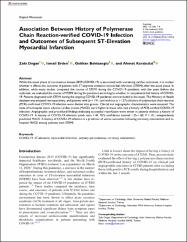Association between history of polymerase chain reaction-verified covid-19 ınfection and outcomes of subsequent st-elevation myocardial ınfarction
Künye
Dogan, Z., Erden, I., Bektasoglu, G., & Karabulut, A. (2022). Association Between History of Polymerase Chain Reaction-verified COVID-19 Infection and Outcomes of Subsequent ST-Elevation Myocardial Infarction. Angiology, 000331972211399. pp. 1-8 https://doi.org/10.1177/00033197221139918 Özet
While the acute phase of coronavirus disease 2019 (COVID-19) is associated with worsening cardiac outcomes, it is unclear
whether it affects the outcome of patients with ST-segment elevation myocardial infarction (STEMI) after the acute phase. In
addition, while many studies compared the course of STEMI during the COVID-19 pandemic with the years before the
outbreak, we evaluated the course of STEMI during the pandemic according to whether or not patients had history of COVID19. Patients diagnosed with STEMI during the ongoing COVID-19 pandemic were included in the study. The Ministry of Health
database was analyzed retrospectively, and patients with (n = 191) and without (n = 127) a history of polymerase chain reaction
(PCR) confirmed COVID-19 infection were divided into groups. Clinical and angiographic characteristics were assessed. The
rates of in-hospital major adverse cardiac events (MACE) were higher in those who had a history of PCR-verified COVID-19
infection. Angiographic and procedural findings indicating successful reperfusion were better in patients without a history of
COVID-19. A history of COVID-19 infection (odds ratio 1.40, 95% confidence interval 1.25–1.60, P < .01) independently
predicted MACE. A history of COVID-19 infection is a predictor of worse outcomes following coronary intervention and inhospital MACE among patients with STEMI.

















